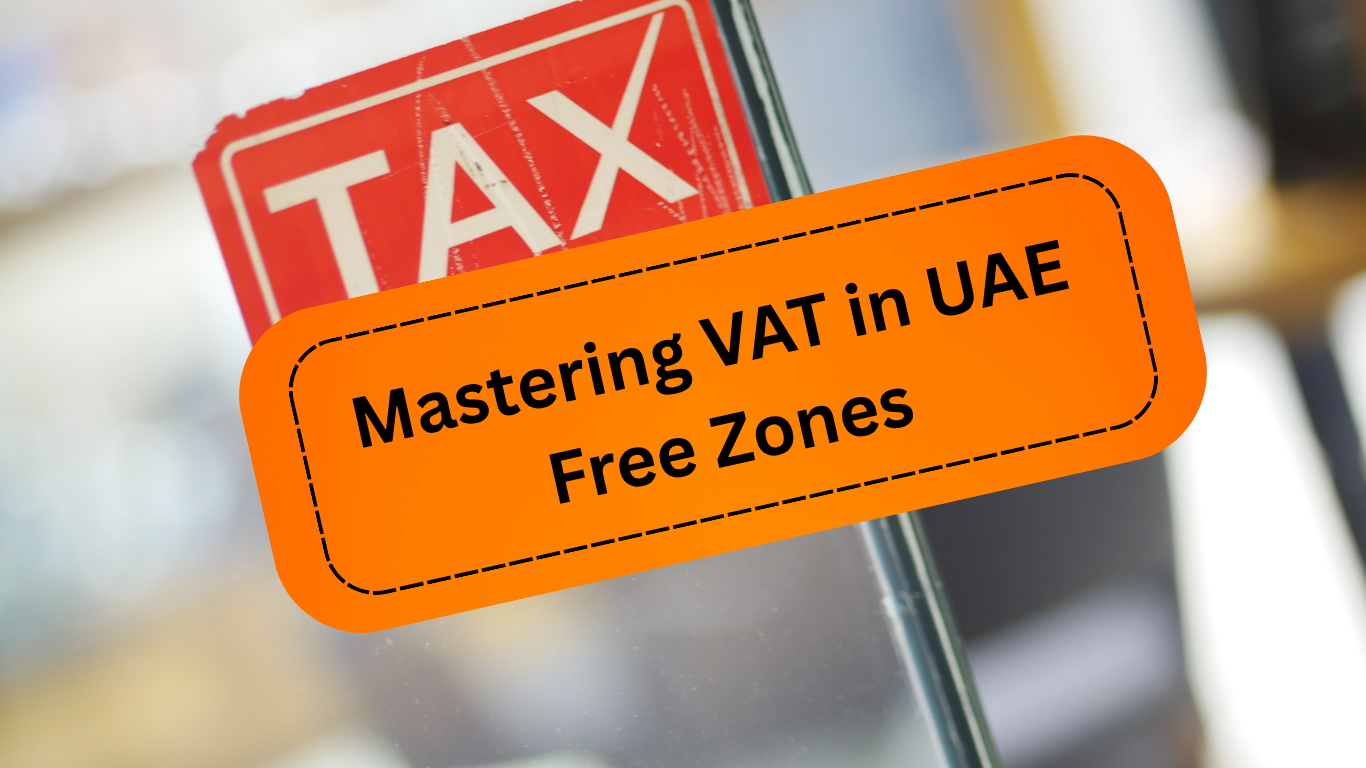The promise of 0% Corporate Tax makes the UAE a prime destination for Australian investors. However, simply setting up in a Free Zone does not mean you are automatically exempt from Value Added Tax (VAT). Navigating VAT in UAE free zones is a complex exercise that requires clarity on the distinction between two critical terms: 'Free Zones' and 'Designated Zones'.
For any Australian business aiming for financial efficiency and total compliance, understanding where the standard 5% VAT applies versus where 0% VAT or out-of-scope treatment is granted is non-negotiable. This comprehensive guide, presented by Flyingcolour®, breaks down the nuances of VAT treatment in free zones UAE and outlines the necessary steps for compliant operations.
Core Distinction: Free Zone Tax vs. VAT Treatment
Many entrepreneurs confuse the Corporate Tax (CT) advantages with the VAT rules. These two tax regimes are separate.
- UAE Free Zone Tax (Corporate Tax): The Free Zone entity may qualify for 0% Corporate Tax on its income, provided it meets Economic Substance and 'Qualifying Income' requirements. This is the structural tax benefit.
- UAE Free Zone VAT: VAT is a transactional tax. All Free Zone companies must register for VAT (if revenue exceeds AED 375,000) and must charge 5% VAT on domestic supplies, just like Mainland companies.
Designated Zone Shield
The most important concept to master is the UAE designated free zones VAT. A 'Designated Zone' (DZ) is a specific, fenced-off Free Zone area treated as being outside the UAE for customs and VAT on goods purposes only.
|
Zone Type |
Legal Status |
VAT on Services (Consulting, etc.) |
VAT on Goods (Sales/Storage) |
|
Standard Free Zone (FZ) |
Inside the UAE |
Standard Rate (5%) |
Standard Rate (5%) |
|
Designated Zone (DZ) |
Treated as outside the UAE |
Standard Rate (5%) |
Out of Scope of VAT (effectively 0%) |
Crucially, even in a Designated Zone, the supply of services (like consulting, legal, or accounting) remains subject to the standard 5% VAT rate if the place of supply is deemed to be in the UAE.
VAT Treatment in Free Zones UAE by Transaction Type
UAE VAT compliance for free zone businesses requires transactions to be categorized into three distinct buckets:
FZ to International (The Zero-Rated Advantage)
When a Free Zone company supplies goods or services exported out of the UAE, the supply is Zero-Rated (0%).
- Example: An Australian trading company in a Free Zone sells goods directly to a customer in Saudi Arabia. The sale is 0% VAT.
FZ to Mainland (The 5% Rule)
Any sale of goods or services from a Free Zone to a customer located in the UAE Mainland is treated as a domestic supply and is subject to the Standard Rate (5%).
- Example: A marketing agency in JAFZA (Free Zone) provides consulting services to a retail client on the Dubai Mainland. This service must be invoiced with 5% VAT.
Supplies Within Designated Zones (The VAT Shield for Goods)
This is the only area where the 'Designated Zone' status grants significant VAT relief:
- Goods Transfers: The transfer of goods between two companies located in the same or different UAE designated free zones VAT is generally treated as being Out of Scope of VAT (effectively 0%).
- Goods Held: Holding or supplying goods located entirely within a DZ is not subject to VAT until the goods physically leave the DZ and enter the UAE Mainland.
This benefit is essential for logistics and trading businesses where goods pass through the UAE without being consumed locally.
Compliance and Risk for Free Zone Businesses
UAE VAT compliance for free zone businesses is often more complex than for Mainland entities because of the intricate record-keeping required to prove zero-rating or out-of-scope status.
- Record-Keeping Mandate: To legally zero-rate a supply, the FZ entity must hold verifiable proof that the goods were exported, including customs documentation, Bill of Lading, or Air Waybills. Failure to hold this evidence means the FTA can retrospectively disallow the zero-rating and impose a 5% tax liability plus severe penalties.
- FTA Audits: The FTA frequently scrutinizes FZ entities due to their unique VAT position. Any lack of substance or misclassification of Mainland vs. international sales can lead to harsh penalties, particularly concerning misapplied zero-rates.
- Australian Tax Link: While your Free Zone income might be 0% in the UAE, the Australian Taxation Office (ATO) will require evidence of compliant UAE structure and genuine economic substance to grant non-residency status to the Australian shareholder.
How Flyingcolour® Secures Your Free Zone VAT Strategy
Navigating the distinctions between FZ and DZ, applying the correct VAT treatment in free zones UAE, and managing the dual compliance for the ATO requires localized expert support. Flyingcolour® ensures your UAE free zone VAT strategy is robust and risk-free.
We ensure compliance by:
- WPS & Documentation: We handle all registration and submission tasks, guaranteeing your foundational compliance records are perfect.
- VAT Structuring Reviews: We perform periodic reviews of your sales invoices and supplier contracts to ensure the zero-rate (0%) is correctly applied only to exports, and that the 5% rate is correctly charged and accounted for on any domestic activity.
- Audit Defence: Our specialists are prepared to provide audit assistance and resolve disputes regarding the application of the zero-rate, protecting your Dubai business from unexpected fines.
Partner with Flyingcolour® to ensure your UAE VAT on free-zone companies is managed correctly, allowing you to maximize the UAE free zone tax benefits.
Conclusion
The benefits of UAE free zone tax (0% CT) are clear, but they do not eliminate the need for meticulous UAE free zone VAT compliance. For an Australian investor, understanding the legal implications of trading within or outside a Designated Zone is the key to minimizing risk. Trust Flyingcolour® to secure your financial operations, transforming compliance into a reliable competitive advantage.
FAQs:
Q1. If my Free Zone company only sells consulting services internationally, do I still need to register for VAT?
A. Yes, if your annual revenue exceeds the mandatory threshold (AED 375,000), you must register for VAT. Although your international services are generally deemed outside the scope of UAE VAT, registration is a legal requirement. Failure to register on time incurs the FTA penalty for late registration.
Q2. Is a Designated Zone exempt from all taxes, including the new Corporate Tax?
A. No. The "Designated Zone" status specifically addresses VAT and customs duty on goods. The Corporate Tax (CT) exemption (0%) is granted by the Federal Tax Law and applies to all Free Zones, provided they meet specific "Qualifying Income" rules. The two exemptions are regulated separately.
Q3. Can I use a single UAE VAT registration for my Free Zone and my Mainland activity?
A. Yes, if both entities are legally controlled by the same owner(s), you can often apply for VAT Group Registration. This simplifies compliance, as you file one consolidated VAT return filing, and transactions between the Free Zone and Mainland entity within the group are disregarded for VAT purposes.
Q4. Does the Free Zone authority handle the UAE VAT compliance for my business?
A. No. The Free Zone Authority handles your trade license and residency visas. UAE VAT compliance for free zone businesses (registration, quarterly/monthly filing, record-keeping) is the legal responsibility of the company itself, managed directly with the FTA. It is highly recommended to appoint an FTA-registered tax agent, like Flyingcolour®, to handle this specialized compliance.
Q5. What documents are needed to prove a supply from a Free Zone is zero-rated (0%)?
A. To justify the 0% rate on goods, you must possess transport documents (e.g., Bill of Lading, Air Waybill) and official Customs export declarations that explicitly show the goods physically left the UAE territory. Without this evidence, the FTA will retrospectively charge the standard 5% VAT.
To learn more about Mastering VAT in UAE Free Zones, book a free consultation with one of the Flyingcolour team advisors.
Disclaimer: The information provided in this blog is based on our understanding of current tax laws and regulations. It is intended for general informational purposes only and does not constitute professional tax advice, consultation, or representation. The author and publisher are not responsible for any errors or omissions, or for any actions taken based on the information contained in this blog.


